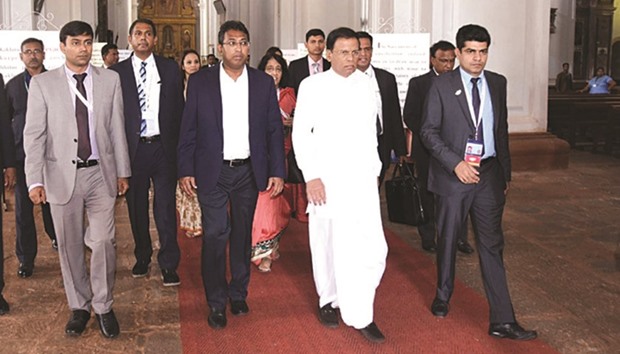Sri Lanka’s top anti-corruption prosecutor resigned yesterday after President Maithripala Sirisena accused her of launching politically-motivated investigations into former military officials, including the brother of his predecessor.
Sirisena, who came to power last year promising to end corruption and restore rule of law, took the unusual step of publicly condemning Dilrukshi Wickramasinghe last week over the prosecution of three retired admirals and the former defence secretary.
Yesterday, Wickramasinghe resigned as head of the Commission to Investigate Allegations of Bribery or Corruption (CIABOC), commission member Neville Guruge said.
Sources close to her said the president’s public comments last week prompted her
decision.
Wickramasinghe, a senior prosecutor from the state attorney general’s department, has launched several high-profile investigations against members of the former regime and the family of former president
Mahinda Rajapakse.
There was no immediate comment from Sirisena, who said last week that military commanders who led the successful campaign to crush separatist Tamil Tiger rebels in 2009 should not be humiliated in such a manner.
The president accused Wickramasinghe’s CIABOC of working according to a “political agenda” and vowed to take unspecified “stern action” against it and two other anti-corruption bodies, the Financial Crimes Investigations Division (FCID) and the Crime Investigations Division (CID).
“I am expressing my disgust at this turn of events. Three navy commanders who served during the war and the former defence secretary were hauled into court,” the president said.
The goal of establishing independent commissions was to restore freedom and democracy, and protect democracy and to build a corruption-free country, he said.
“These commissions cannot carry out political agendas. They must understand their remit,” the president added.
“As defence minister and president, I am disgusted.”
Sirisena’s comments were widely criticised by the civil society and minor political parties who urged the president to refrain from making statements that would weaken criminal investigations and prosecutions.
Analysts said the president’s remarks signalled a rift between him and the national unity government led by Prime Minister Ranil Wickremesinghe, which oversees the FCID and the CID.
The two men are from rival parties, but made common cause to topple former strongman Rajapakse, whose entire family and closest associates face allegations of corruption as well as murder.
Members of the former regime are accused of siphoning billions of dollars from the country during Rajapakse’s decade in power that ended on January 8, 2015.
The new government is yet to deliver on promises to the UN that it will investigate allegations that troops under Rajapakse’s command killed at least 40,000 Tamil civilians while battling separatists in the final months of an ethnic war that ended in 2009.

PRESIDENT IN GOA: Sri Lankan President Maithripala Sirisena visits Bom Jesus church and Se Cathedral in Goa, India yesterday.
